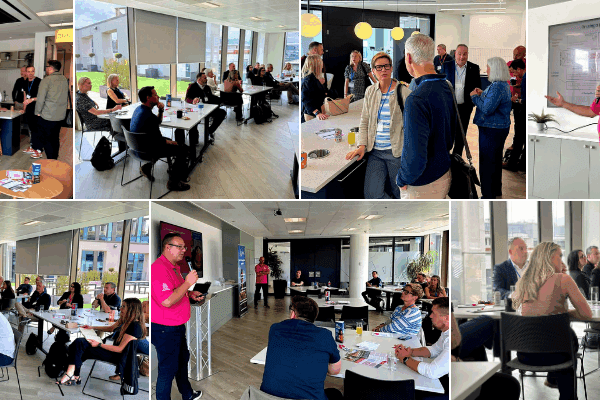What is a workplace menopause champion? Does your business need one? Let’s chat to Ellie Sykes to find out…
You kickstarted our efforts to make MERJE a more ‘menopause friendly’ workplace, what made you decide to start the conversation?
I read a shocking statistic about how many successful women in business become so overwhelmed during menopause that they quit their job. I didn’t want MERJE employees to suffer in silence or feel like they had to leave – we’d be losing great employees who we can absolutely support through this time of their lives.
Personally, I had struggled with a bout of insomnia so I knew how debilitating the symptoms can be. I wanted to make sure everyone in the team feels understood and heard so they know the support is there when they need it.
Thankfully, there is increasing conversation and awareness of menopause and its effects, with more and more businesses taking action to support their staff. We’re proud to be in that network of companies which are making positive steps.
BUPA research has revealed that almost 900,000 women in the UK have left their jobs because of menopausal symptoms.
You have volunteered yourself as MERJE’s workplace menopause representative. What does this mean?
My aim is firstly to take the stigma away from conversations about menopause – it shouldn’t be a taboo subject! I’m also here as the central point of contact for everyone – employees if they need some advice or a listening ear, and managers if they think someone in their team needs support.
I had done plenty of wider reading on the subject myself, but MERJE encouraged me to attend a training course so I could understand the best ways to offer and deliver support in a workplace setting. From there, I’m planning some sessions where employees can get together to discuss all things menopause and raise any ideas, concerns, or thoughts they have.
We’ve also already put a new Menopause in the Workplace policy in place and shared a poster with some helpful advice and links, both of which make our stance clear (that we’re flexible and want to support everyone however we can).
Speaking of your recent training course, what were your key takeaways?
The sheer number of symptoms is astounding. So many women think they have (and are treated as having) depression when it is in fact the hormonal changes of menopause that are causing the low mood. Also, a quarter of all women will have severe symptoms during this time – that is a lot of women!
I also learned that there are a lot of places where you can get information and support – from The British Menopause Society to the Henpicked Menopause hub – there are more provisions out there than you might think.
CIPD has found that a third of women said they had been unable to go into work because of their menopause symptoms.
What advice would you give to someone whose menopause symptoms are affecting them at work?
Talk about it! Speak to your doctor to find out what options you have – there are many hormone and non-hormone based choices to consider that might really help. Speak to your boss and colleagues so they understand why you are struggling and what they can do to help. Speak to family and friends, support and understanding at home is very important too. The worst thing to do is suffer in silence. If no one knows you’re having a hard time, they can’t give you the help you need!
Are there any myths about the menopause that you want to debunk?
I think a lot of people believe its all about hot flushes in women in their late fifties and that’s it. But there are so many different symptoms that present and it can also affect people at such a broad range of ages.
As well as this, there’s often an assumption that menopause only affects the women going through it. In reality, the menopause affects marriages, careers, parenting, and much more, which can have knock on effects for friends, family, co-workers, etc.
It really is something that everyone needs to understand!
Related Articles:
Workplace Menopause Support – what the MERJE team has to say







